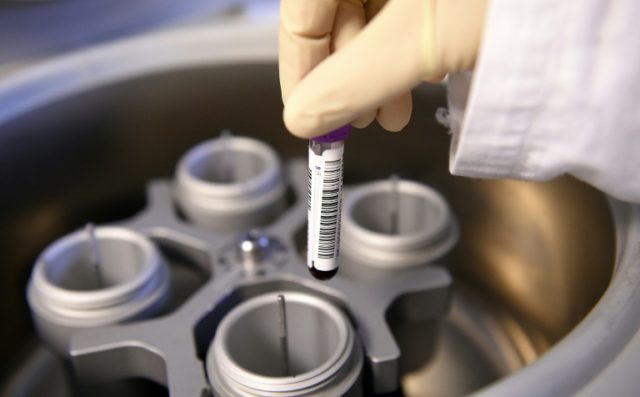Miami (AFP) – A blood test is being developed by US researchers that may indicate whether a person with stage 2 colon cancer is likely to see that cancer return after surgery, a study said Wednesday.
The test by scientists at Johns Hopkins University looks for tumor DNA circulating in the blood, according to the report in the journal Science Translational Medicine.
Stage 2 colon cancer is considered an early form that has not spread to other tissues, and can most of the time be cured by surgically removing the tumor, according to Bert Vogelstein, co-director of the Ludwig Center at the Johns Hopkins Kimmel Cancer Center.
But tumors can regrow in as many as 40 percent of patients, making it difficult for doctors to predict who would benefit from chemotherapy after surgery and who would not.
“Some of these cancers will recur, and we need to improve our diagnostic approaches to detect recurrence earlier than it can be found with current, conventional methods,” he said.
The new genetic test was used on 230 Australian patients with stage 2 colon cancer.
More than 1,000 blood samples were collected from the patients over the course of four years, as doctors looked for bits of cancer-related DNA circulating in their blood.
Their tumors were also genetically tested, and researchers tracked each patient’s cancer-related mutation in his or her blood samples in the months and years after surgery.
Just 20 of the 230 patients were found to have cancer-linked DNA fragments in their blood.
Fourteen of those patients had not opted for additional chemotherapy after surgery, and 11 of them developed a recurrence of cancer.
Of the six who showed cancer-linked DNA in the blood even though they had undergone chemotherapy, three saw their cancer return.
The test was far from foolproof.
Of the initial group of 230, another 14 patients saw their cancer return even though their blood tests had not showed any fragments of tumor-linked DNA.
“Although this and other DNA-based blood tests are not perfect, this study shows that when we find tumor DNA circulating in the blood of cancer patients, recurrence is very likely,” said Nickolas Papadopoulos, professor of oncology at the Johns Hopkins University School of Medicine.
With further research, scientists hope to improve on genetic-based blood tests to identify high-risk patients who could benefit from more aggressive cancer treatment.
“There is mounting evidence that circulating tumor DNA (ctDNA) is a viable approach for earlier detection of cancer recurrence, and more research is underway to refine the technology, improve its sensitivity and determine the best testing intervals,” said Kenneth Kinzler, co-director of the Ludwig Center at the Johns Hopkins Kimmel Cancer Center.
The US Food and Drug Administration has not yet approved any such DNA-based cancer blood tests for the market.
If and when they become available to consumers, the cost may range from hundreds to thousands of dollars, researchers said. It remains to be determined whether they would be covered by insurance.

COMMENTS
Please let us know if you're having issues with commenting.